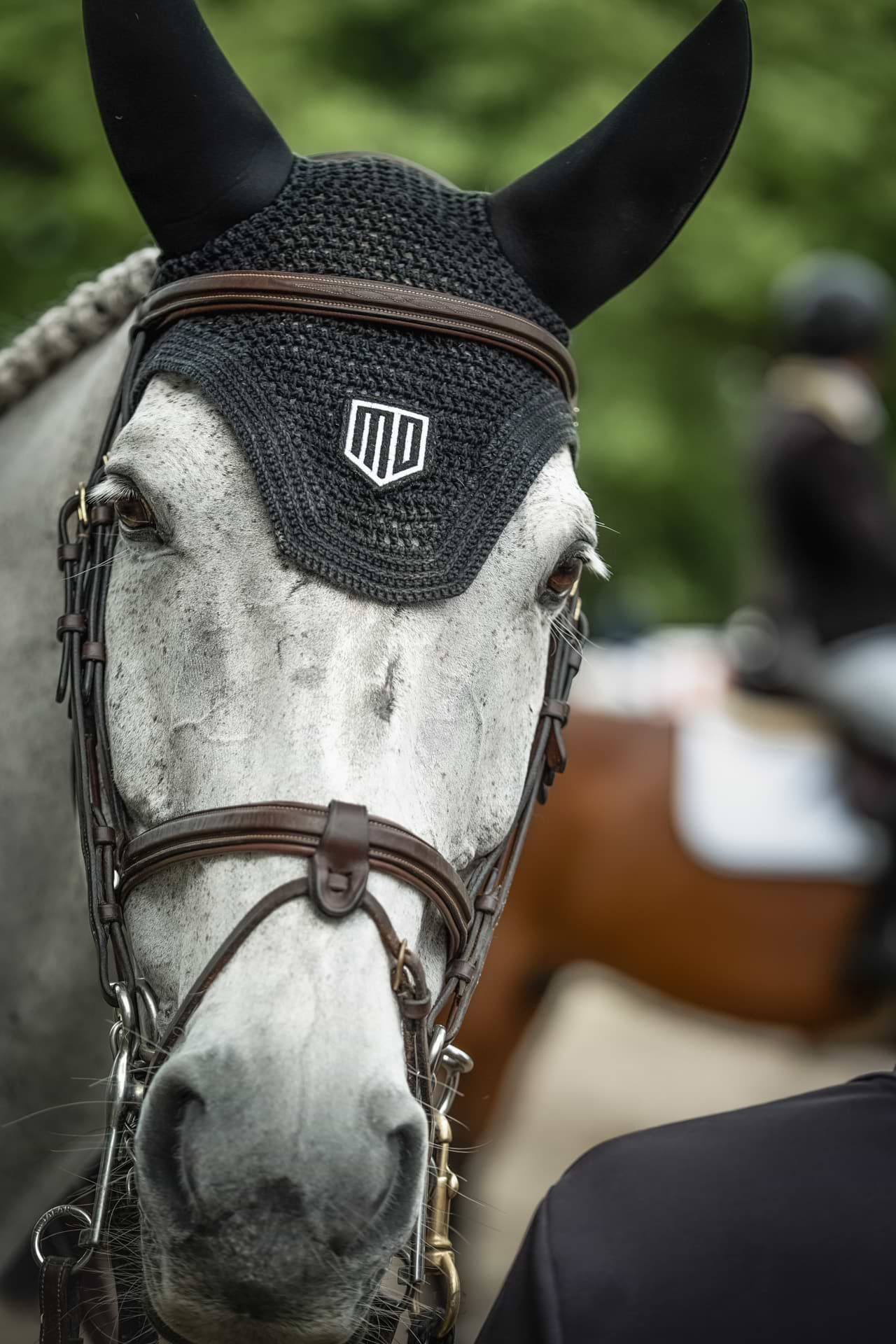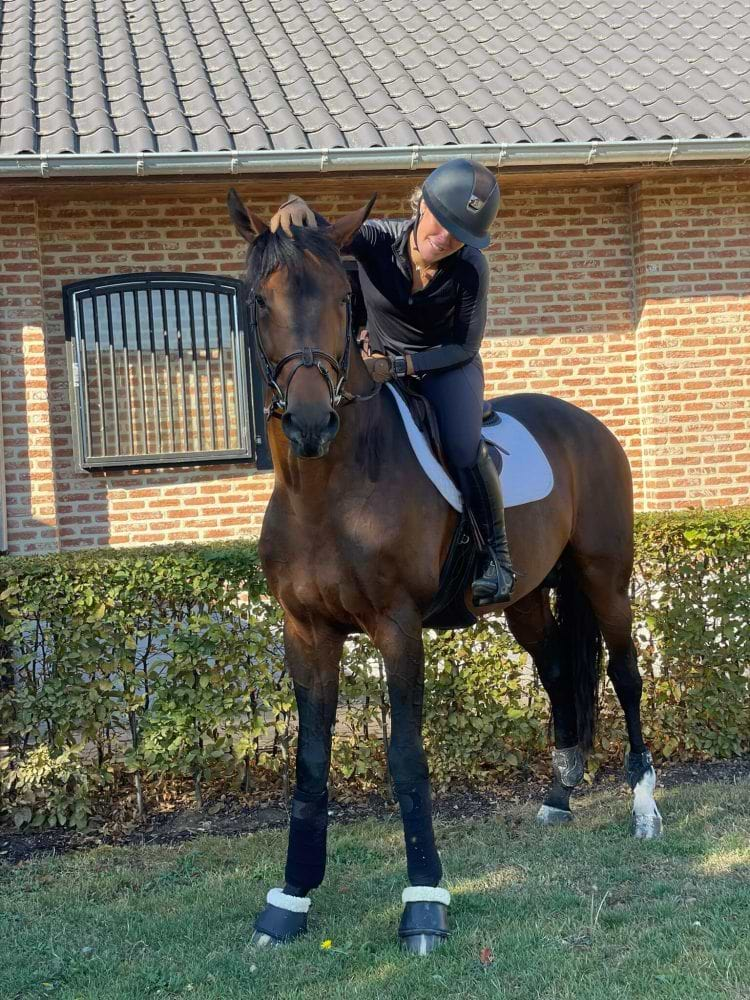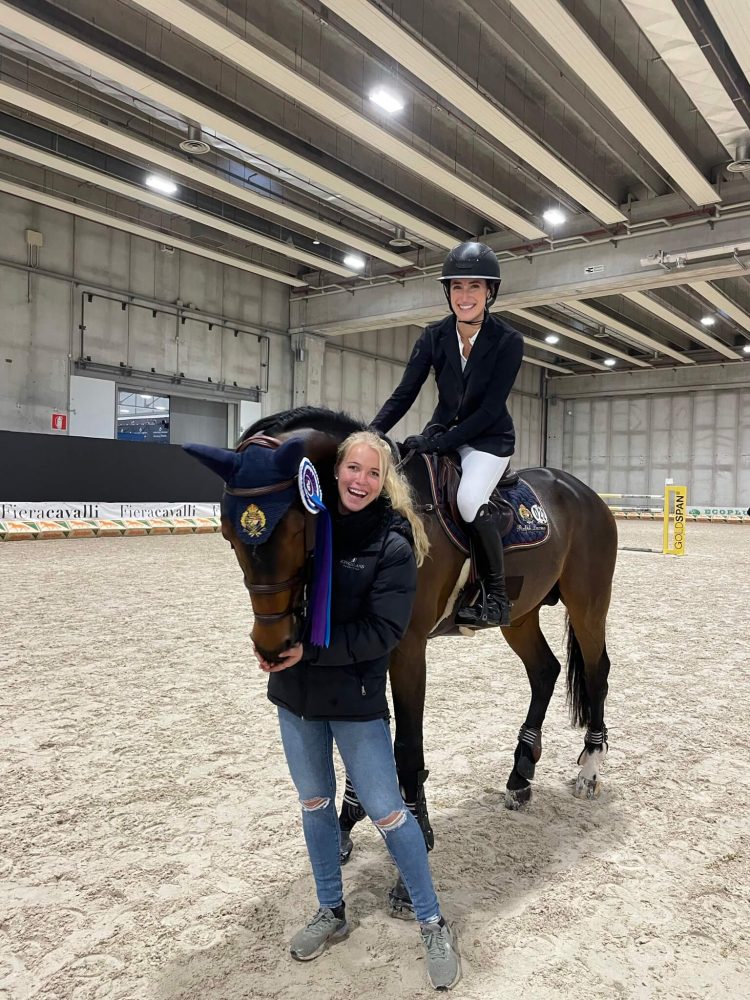Josie Eliason's Story:
The Life of an Elite Level Show Groom
What is it like to be a top-level groom in the USA? Josie Eliason, show groom for Jessica Springsteen, shares her journey.
Amanda
Thu 20 Jul - 23

Josie Eliason's Story:
The Life of an Elite Level Show Groom
What is it like to be a top-level groom in the USA? Josie Eliason, show groom for Jessica Springsteen, shares her journey.
Amanda
Thu 20 Jul - 23
When I call Josie at our agreed interview time, she's driving in her horse trailer. The summer season has kicked off, and she has a busy schedule ahead with both shows and traveling. Finding a free slot in a show groom's packed calendar can be quite the challenge! But being a show groom often goes hand in hand with being a real planning pro with extraordinary multitasking skills.
The jam-packed calendar and constant traveling with subsequent jet lag are part of the everyday life she has chosen and loves. Since 2015, Josie Eliason has been working on the team of American show jumper Jessica Springsteen. As Jessica's show groom, she accompanies her to shows all over the world and is responsible for travel administration and planning. It's a job that demands exceptional precision, structure, and efficiency. We were curious to hear more about what daily life looks like as an elite-level show groom. What are her tasks? How did she land the job in the US? What tips does she have for aspiring grooms? Let's dive into our conversation!
When did you first come into contact with horses?
– I started riding when I was six years old at a small privately-owned riding school near where we lived. At first, I tagged along with a friend to the stable when she was going to ride, and I was instantly hooked. So, I kept nagging my parents until they finally let me start taking riding lessons.
– My mom had a bad accident when she was younger and was very scared of horses when I started riding, so she kept her distance. For me, it was the opposite: As I grew more passionate about it, I spent every free moment at the stable. When I eventually got my first pony, my mom's fear started to fade, and she could eventually come along to shows, help out, and even ride again!
What did your riding career look like after that?
– I first competed in pony classes at the amateur level, and then with horses up to 1.20 m. The stable owners had this older show mare who ended up having a foal. I clicked instantly with that foal and got the opportunity to help with starting and training her. The owners then offered me the chance to buy her when she was four years old, and we competed together in some young horse classes.
How did you transition from competing yourself to becoming a show groom?
– When my young horse started jumping bigger classes, we tried to qualify for the breeders' championship and went to the young horse finals at Falsterbo. It was actually the stable owner's daughter who rode the horse, and I used to tag along to the shows as her groom. I enjoyed it right from the start and felt that I was good at it. But at that time, I didn't really see it as an opportunity to switch careers. I had a different job as an operator at an emergency call center in Sweden, where I spent my days in front of a computer with nine screens. It was quite the opposite of what I do today, haha. When I was around 25 years old, I traveled to Switzerland to visit a couple of friends who worked with horses. I was there for four days, and during that time, I realized, "This is what I want to do." The owners of the stable where I rode had always been like a family to me, and they kindly offered to take care of my horse if I wanted to go. So, I packed my bags and moved abroad to follow my dream.
“The dream was, of course, to work in the equestrian industry.”
– Josie Eliason
What attracted you to this profession?
– First and foremost, obviously being able to work with my greatest passion, horses. But also, the opportunity to travel all over the world, spend a lot of time outdoors, and see so many different places. Then I really like the show part of the work too, and think it is both exciting and motivating to follow along to shows. Being a show groom is hard work, but it also offers a lot of freedom. I love everything about this job. No matter how challenging it can be, it's always worth it!
How did you end up with Jessica Springsteen?
– I worked as a groom in Switzerland for a little over a year, spending most of my time at the stable. I wanted to follow along to more shows, too, but at that time, having a truck driver's license was almost always a requirement for show grooms, which I didn't have. So, I left that stable with the intention of returning to Sweden and obtaining that license.
– However, before I could even start studying for the license, someone recommended me for an available position as a groom at Stal Tops in the Netherlands, who were heading to Florida and Wellington. Going to the US and working in Florida had been a big dream of mine for a long time, so I had to give it a shot and apply for the job – which I actually got! Back then, I wasn't quite sure what to expect or even which rider I would be grooming for. But I went for it, packed my bags once again, and left Sweden. Then I found out that I would be joining Jessica Springsteen's team.
“I thought that worst case scenario, I could just move back home again. I've been here for almost eight years now.”
– Josie Eliason
How has your role changed over the years?
– My role has changed a lot! When I started, there was already a show groom in place, but I still took the opportunity to come to Florida. So, initially, I was a home groom, taking care of eight to nine horses a day. Then, gradually, I started going to shows when the regular show groom couldn't or was away at another event. After about a year, the show groom wanted to step back and spend more time at the stable, so we switched roles within the team. So, since 2017, I've been doing the shows.

What does your daily life look like?
– The longer I've worked in the team, the broader my role has become, and more responsibilities have been entrusted to me. We are a small team without a stable manager, so I also have the role of manager and do some paperwork in addition to the shows. Especially when we fly between the USA and Europe, there's a lot of administrative work to keep track of. For example, ensuring all vaccinations are up to date, completing entry forms, and, of course, planning the logistics of flights and ensuring the horses have time to rest.
– There's a lot to consider, but we have a clear routine and always plan about four weeks ahead. My daily life involves a lot of traveling. This afternoon, I've been in Europe for a week and flew in from Mexico last week. Before that, I was in the USA, and in two weeks, I'll be heading to Rome.
Oh, does that mean you're constantly jet-lagged?
– Well, it's actually not that bad, haha! This year, we spent six months in the USA, so right now I'm really jet-lagged. I always find it much harder to adjust back to European time. But on the flip side, if you don't sleep as much, you get a lot of other things done, haha. I remember one year that was particularly tough when I flew from the USA to Europe. I was in Europe for one and a half days before flying on to Shanghai, which has a twelve-hour difference from where I was before in the US. You simply learn to sleep whenever you can.
You really get to see the world, don't you?
– Yes, and that's what's so amazing about it! In recent years, I've started going for a run in all the new places we visit to see more than just the arena and the stables. Thanks to this job, I get to explore so many incredible locations that I would never have had the chance to visit otherwise. But, of course, it has its ups and downs. Being a show groom is not your typical nine-to-five job. More than a job, it's a lifestyle, you live for these horses.
“If there's a horse that's not feeling well, you're there. It doesn't matter if you have other plans or a dinner reservation.”
– Josie Eliason
What are the future plans for Team Springsteen?
– Right now, our next big goal is the Pan American Games in Chile, which is the North and South American version of the European Championships.
How does one prepare as a groom for a championship?
– I think the key is to not make a big deal out of it. A championship is, of course, an important competition, but in the end, it's just like any other competition. It's best for the horses if you can stick to their regular routine, the one they're used to.
– My main task, I would say, is to ensure that the competing horses are happy and well. Set up a good competition plan for the year where you compete enough to keep the horses in shape but not too much. And, of course, choose competitions that you believe will be a good fit. Since a championship involves many demanding rounds, something I usually help with in terms of preparation is building up their fitness beforehand.
Any tips for finding jobs as a groom?
– I actually started a recruitment website called Yehaww, which works a bit like LinkedIn for the horse industry. There, you can create a profile and browse through job listings. I started the project to make it easier for people who want to start working as, for example, grooms to find available positions. Previously, it may have been more about reaching out to someone who knows someone who knows someone, which can be quite daunting. My hope is to make the transition into the horse industry smoother. So, if you're looking for groom jobs, a hot tip is to check it out!
What would you say is important to consider before starting to work as a groom?
First and foremost, it's always good to research the regulations regarding insurance, work permits, visas, etc., in the country you want to go to. Many countries require mandatory health insurance, so check those things in advance.
Clarify what's included with your prospective employer. Many groom jobs come with accommodation, and sometimes even meals.
Be open to learning. You don't need to have a wealth of knowledge or experience to succeed as a groom, but you need to be willing to learn. I've been working in this field since 2014 and I still learn new things every week. There are so many talented grooms to learn from, and everyone has their own ways and methods. It's not about how good you are, but how good you want to become.
